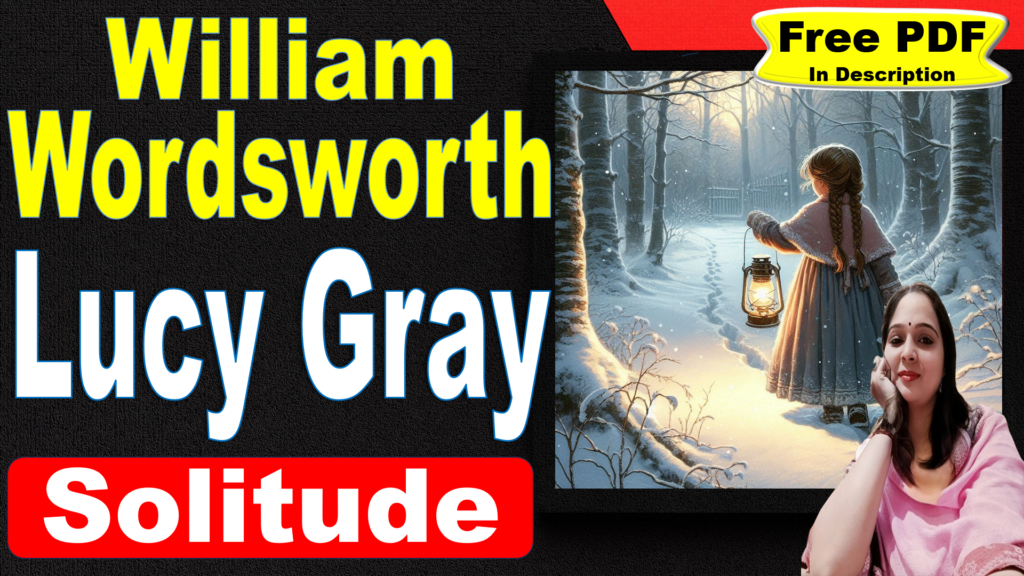
Essay Type Questions
Write the critical appreciation of the poem “Lucy Gray”.
Introduction
“Lucy Gray,” a poignant ballad by William Wordsworth, stands as a testament to the Romantic poet’s fascination with nature, innocence, and the human condition. Written in 1798 and published in Lyrical Ballads, the poem reflects Wordsworth’s deep engagement with themes of isolation, nature’s power, and tragic fate. The poem’s narrative, combined with its lyrical quality, offers a rich ground for critical analysis, revealing the intricacies of Wordsworth’s poetic vision.
Central Idea
The central idea of “Lucy Gray” revolves around the tragic story of a young girl who ventures out into a storm to help her mother, only to disappear into the wild. The poem explores themes of solitude, the overwhelming power of nature, and the impact of fate on innocent lives. Through Lucy’s tale, Wordsworth delves into the emotional and physical landscapes of isolation and loss, portraying both the beauty and the danger inherent in the natural world.
Structure & Rhyme Scheme
The poem is structured as a ballad, characterized by its narrative form and musical quality. It consists of sixteen quatrains, each following a consistent rhyme scheme of ABAB. This rhyme scheme contributes to the poem’s rhythmic flow, enhancing its lyrical nature and making it accessible and memorable. The straightforward structure reflects the ballad tradition, which emphasizes storytelling through concise and rhythmic verse.
Theme
Isolation and Solitude: Lucy Gray’s life on the wild moor and her solitary journey highlight the theme of isolation. Her physical and emotional separation from others underscores the loneliness she experiences.
The Power of Nature: The storm represents the unpredictable and uncontrollable aspects of nature, illustrating its capacity to both inspire awe and cause harm.
Tragic Innocence: Lucy’s innocent intentions lead to a tragic end, emphasizing the vulnerability of youth and the harsh realities of fate.
Memory and the Supernatural: The idea that Lucy Gray may still be seen wandering the moor introduces a supernatural element, reflecting how memories of the deceased can linger.
Style
Wordsworth’s style in “Lucy Gray” is marked by simplicity and emotional depth. The language is straightforward yet evocative, capturing the essence of the natural world and the tragic elements of the story. Wordsworth employs vivid imagery and sensory details to immerse the reader in the poem’s setting and emotional landscape. The ballad form allows for a direct and accessible narrative while maintaining a lyrical quality.
Poetic Devices
Imagery: Vivid descriptions of the moor, storm, and Lucy’s journey create a strong sense of place and atmosphere.
Symbolism: Objects like the lantern and the storm symbolize guidance, hope, and the overwhelming power of nature, respectively.
Metaphor and Simile: Comparisons, such as Lucy being the “sweetest Thing” and the snow rising “like smoke,” enhance the poem’s emotional impact and visual imagery.
Personification: Nature is given human-like qualities, such as the storm coming “before its time,” emphasizing its formidable presence.
Critical Commentary
Samuel Taylor Coleridge: Coleridge admired Wordsworth’s ability to weave simple, yet profound, narratives into his poetry. He praised the emotional resonance and natural beauty depicted in “Lucy Gray.”
William Hazlitt: Hazlitt highlighted the poem’s effectiveness in capturing the innocence and tragedy of its protagonist. He appreciated Wordsworth’s skillful blending of personal loss with universal themes.
John Ruskin: Ruskin viewed “Lucy Gray” as an exemplary piece of Romantic poetry, emphasizing its portrayal of the sublime in nature and its exploration of the human condition through a simple, yet powerful, story.
Message
“Lucy Gray” conveys a message about the interplay between nature, fate, and human experience. It underscores the beauty and danger of the natural world, the vulnerability of innocence, and the enduring presence of memory. The poem suggests that even in the face of tragedy and loss, the essence of those we have loved can continue to resonate through memory and imagination.
Conclusion
William Wordsworth’s “Lucy Gray” is a masterful exploration of isolation, nature, and tragic innocence, crafted through a blend of narrative simplicity and lyrical beauty. The poem’s structure, rhyme scheme, and poetic devices work together to create a moving and evocative story. Through critical commentary, we see its lasting impact and the skill with which Wordsworth addresses universal themes. Ultimately, “Lucy Gray” remains a poignant reflection on the fragility of life and the enduring power of memory.
Long note on themes used in the poem “Lucy Gray” by William Wordsworth
1. Isolation and Solitude
Isolation is a central theme in “Lucy Gray.” The poem vividly portrays Lucy Gray’s physical and emotional isolation. She lives alone on a wild moor, cut off from society and companionship, emphasizing her solitude. Her journey through the storm further underscores her isolation, as she ventures out alone, separated from her family and community. The desolate landscape mirrors her inner loneliness and separation from the world.
2. The Power of Nature
Nature plays a crucial role in the poem, reflecting both its beauty and its dangers. The wild moor and the storm symbolize the unpredictability and harshness of nature. While the moor is depicted as a serene yet isolated place, the storm represents nature’s formidable power and its capacity to disrupt human life. Lucy Gray’s struggle against the storm highlights nature’s indifferent and sometimes cruel force, which stands in stark contrast to the serenity often associated with the natural world.
3. The Tragic Fate of Innocence
Lucy Gray’s fate embodies the theme of tragic innocence. Her untimely disappearance and presumed death reflect the vulnerability of youth and the often-uncontrollable nature of tragic events. The innocence of her character is highlighted by her willingness to undertake a dangerous journey for the sake of her mother, showcasing her purity and selflessness. Her tragic end serves as a poignant reminder of how innocence can be overwhelmed by forces beyond one’s control.
4. The Search for Meaning and Closure
The desperate search by Lucy Gray’s parents represents the theme of seeking meaning and closure in the face of loss. Their frantic search and eventual discovery of her footprints symbolize their need to understand and come to terms with her disappearance. The footprints serve as a tangible connection to Lucy, offering a sense of closure and a path to follow, even though it leads to an ambiguous and haunting conclusion.
5. Memory and the Supernatural
Memory and the supernatural are intertwined in the poem’s final stanza. The suggestion that Lucy Gray might still be seen wandering the wild as a ghostly presence introduces a supernatural element. This theme reflects the way memory can preserve the essence of a person even after their physical presence is gone. Lucy Gray’s continuing presence in the wild symbolizes how memories of lost loved ones persist, haunting the places they once inhabited.
6. The Role of Fate and Chance
The poem also explores the theme of fate and chance through Lucy Gray’s unexpected encounter with the storm. Her journey, which begins with hopeful intentions, is thwarted by unforeseen circumstances. The randomness of the storm and her tragic fate illustrate how chance events can dramatically alter the course of one’s life, emphasizing the unpredictable nature of human existence.
7. The Contrast Between Beauty and Harshness
The poem contrasts the natural beauty of Lucy Gray’s surroundings with the harsh realities she faces. The moor is described as a place of serene beauty, yet it becomes a setting for her tragic struggle. This juxtaposition highlights the dual nature of nature as both a source of inspiration and a formidable challenge, reflecting the complexities of life itself.
Conclusion
In “Lucy Gray,” Wordsworth masterfully weaves together themes of isolation, nature’s power, tragic innocence, and the quest for closure. The poem’s exploration of these themes reveals the intricate relationship between humanity and the natural world, as well as the emotional depth of personal loss and memory. Wordsworth’s portrayal of Lucy Gray’s solitary journey and its tragic outcome invites readers to reflect on the broader implications of these themes in their own lives and experiences.





